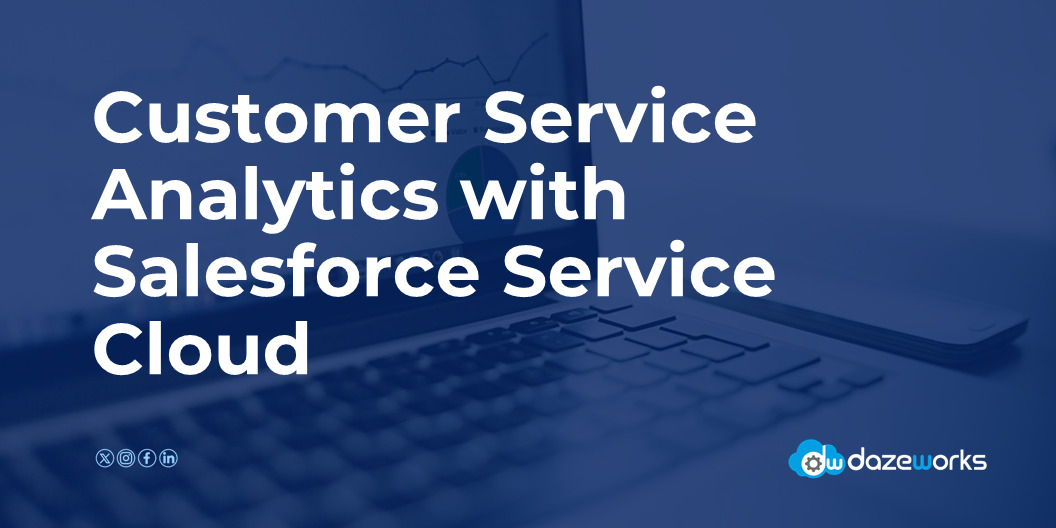
Customer Service Analytics with Salesforce Service Cloud
minutes read
As businesses strive to outshine competitors and retain loyal customers, leveraging innovative technologies becomes imperative. Among these, Salesforce Service Cloud emerges as a game-changer, offering a suite of tools designed to streamline customer service operations. However, one aspect that often remains untapped is the transformative potential of customer service analytics within Salesforce Service Cloud.
Unveiling the Essence of Customer Service Analytics
Customer service analytics is not merely about crunching numbers or generating reports; it is about gaining actionable insights that drive meaningful improvements. At its core, it involves the systematic analysis of customer interactions, feedback, and operational metrics to identify patterns, trends, and areas for enhancement. Within the realm of Salesforce Service Cloud, this translates into harnessing the wealth of data generated through various touchpoints to deliver unparalleled customer experiences.
The Power Duo: Salesforce Service Cloud & Analytics
Enhanced Customer Understanding
Analytics empowers businesses to gain deeper insights into customer behavior, preferences, and pain points. By analyzing historical data and sentiment analysis from interactions, businesses can tailor their service offerings to better align with customer expectations.
Predictive Support
Through predictive analytics, Service Cloud can anticipate customer needs and proactively address issues before they escalate. By identifying recurring problems or trends, businesses can implement preventive measures, thereby minimizing customer effort and enhancing satisfaction.
Performance Optimization
Analytics-driven insights enable businesses to optimize service performance at every touchpoint. By tracking key metrics such as response times, resolution rates, and customer satisfaction scores, organizations can identify bottlenecks and inefficiencies, enabling continuous improvement.
Personalized Engagement
By leveraging analytics to segment customers based on their preferences and behavior, businesses can deliver personalized experiences at scale. Whether it is recommending relevant products or offering tailored support solutions, personalized engagement fosters stronger customer relationships and drives loyalty.
Data-Driven Decision Making
Analytics empowers businesses to make informed decisions backed by data-driven insights. Whether it is resource allocation, process optimization, or strategic planning, having access to real-time analytics within Service Cloud enables stakeholders to act swiftly and decisively.
Impact of Salesforce Service Cloud in Various Industries
Retail
In the retail sector, customer service analytics can help businesses understand purchasing patterns, identify high-value customers, and optimize inventory management. By analyzing customer feedback and sentiment, retailers can tailor promotions and offerings to meet evolving consumer preferences.
Healthcare
In the healthcare industry, Service Cloud analytics can streamline patient support processes, improve appointment scheduling, and enhance care coordination. By analyzing patient feedback and service metrics, healthcare providers can identify opportunities to enhance patient experiences and outcomes.
Financial Services
In financial services, analytics-driven insights can enhance fraud detection, improve compliance, and personalized financial advice. By analyzing transaction data and customer interactions, banks and financial institutions can identify suspicious activities and deliver targeted recommendations to clients.
Implementing Customer Service Analytics with Salesforce Service Cloud
While the potential benefits of customer service analytics are clear, implementing a successful analytics strategy within Salesforce Service Cloud requires careful planning and execution:
Define Key Metrics
Identify the key performance indicators (KPIs) that align with your business objectives and customer service goals. Whether it is response times, resolution rates, or customer satisfaction scores, defining clear metrics ensures that your analytics efforts are focused and actionable.
Leverage Advanced Analytics Tools
Take advantage of advanced analytics tools within Salesforce Service Cloud, such as Einstein Analytics, to uncover hidden insights and trends. By harnessing the power of AI and machine learning, businesses can extract actionable insights from large volumes of data with ease.
Foster a Data-Driven Culture
Promote a culture of data-driven decision-making across your organization, from frontline support agents to senior executives. By empowering employees with access to real-time analytics and training them to interpret data effectively, businesses can drive continuous improvement and innovation.
Iterate and Adapt
Customer service analytics is an ongoing journey of continuous improvement. Regularly review and iterate on your analytics strategy based on feedback, performance metrics, and changing business needs. By staying agile and adaptable, businesses can stay ahead of the curve and deliver exceptional customer experiences.
Conclusion
In an era defined by heightened customer expectations and digital disruption, leveraging the power of customer service analytics within Salesforce Service Cloud is no longer a luxury but a necessity. By harnessing the wealth of data generated through customer interactions, businesses can gain deeper insights, drive operational efficiencies, and deliver personalized experiences that drive loyalty and growth. As organizations continue to prioritize customer-centricity, embracing customer service analytics emerges as a strategic imperative for success in the digital age.
